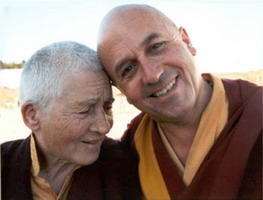 by Flemming Funch by Flemming Funch
The Independent: To scientists, he is the world's happiest man. His level of mind control is astonishing and the upbeat impulses in his brain are off the scale.
Now Matthieu Ricard, 60, a French academic-turned-Buddhist monk, is to share his secrets to make the world a happier place. The trick, he reckons, is to put some effort into it. In essence, happiness is a "skill" to be learned.
His advice could not be more timely as tomorrow Britain will reach what, according to a scientific formula, is the most miserable day of the year. Tattered new year resolutions, the faded buzz of Christmas, debt, a lack of motivation and the winter weather conspire to create a peak of misery and gloom.
But studies have shown that the mind can rise above it all to increase almost everyone's happiness. Mr Ricard, who is the French interpreter for Tibet's spiritual leader, the Dalai Lama, took part in trials to show that brain training in the form of meditation can cause an overwhelming change in levels of happiness.
MRI scans showed that he and other long-term meditators - who had completed more than 10,000 hours each - experienced a huge level of "positive emotions" in the left pre-frontal cortex of the brain, which is associated with happiness. The right-hand side, which handles negative thoughts, is suppressed. 10,000 hours?!? Hopefully less can do it. I want to be really happy too, for no good reason.
|
|
 by Flemming Funch
by Flemming Funch